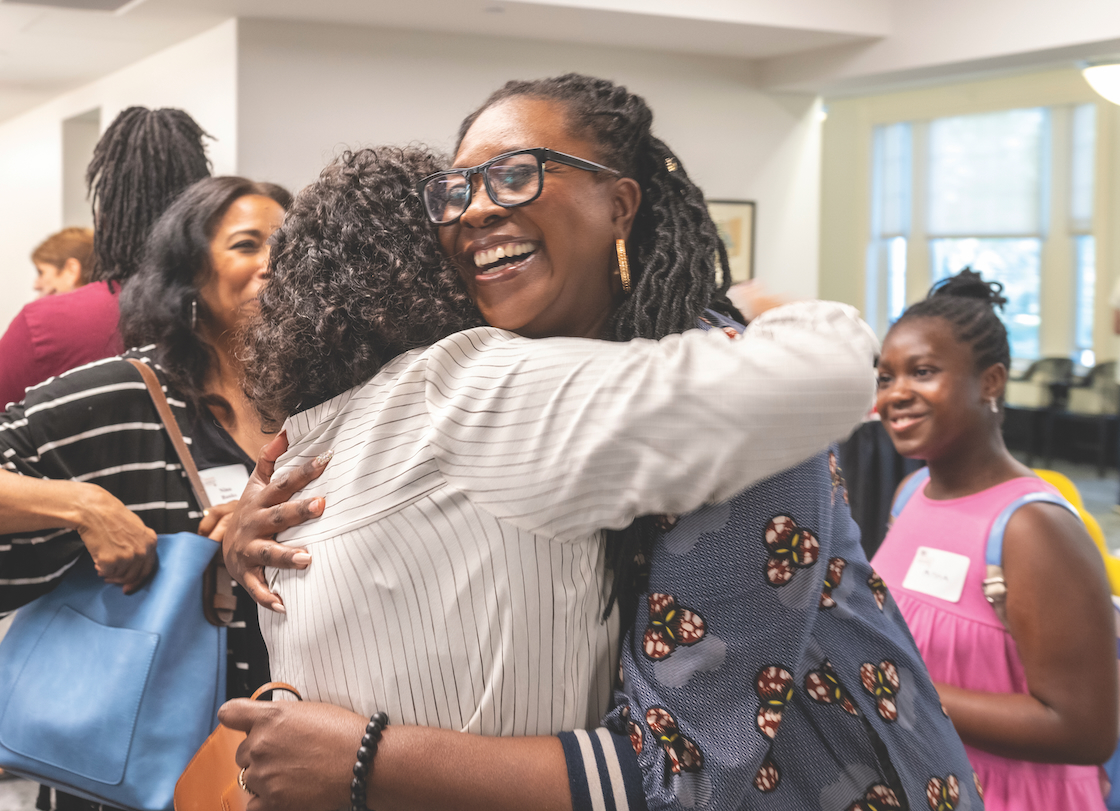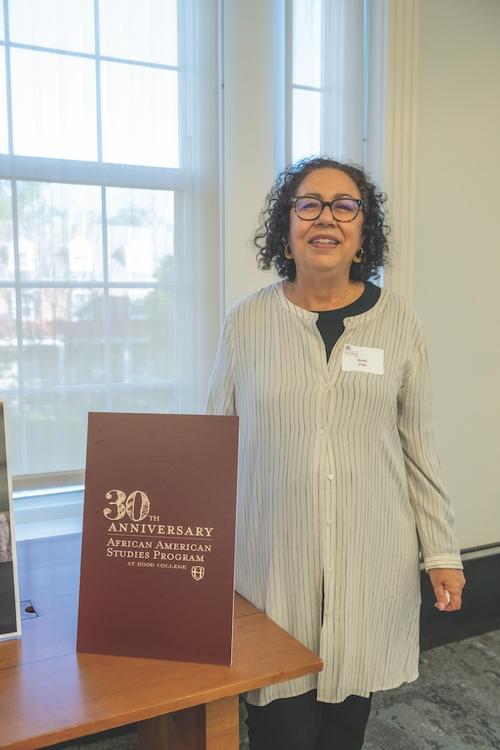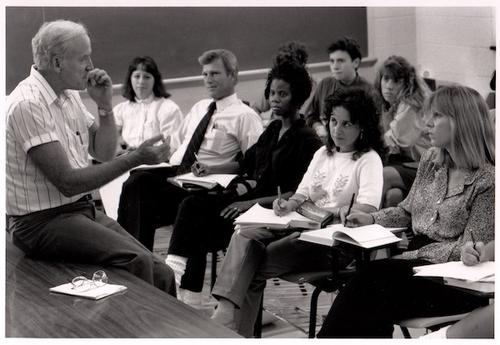More Than History | 30 Years of African American Studies at Hood

The feature story from Hood Magazine's fall 2024 issue, celebrating 30 years of African American studies at Hood.
Hood Magazine Fall 2024
Program
- African American Studies (Minor)
Department
- English & Communication Arts
- Global Languages & Cultures
- History
Bridging the gap between centuries of history and contemporary issues of race is no easy feat, but this is exactly what the African American studies program at Hood College does. Formally established in 1994, the program celebrated its 30th anniversary this year. Although the program continues to evolve with the times, it has consistently represented Hood’s interdisciplinary, liberal arts foundation as well as the diversity of the campus community.
Before its formal founding, the African American studies program traces its roots back to a national tragedy—the assassination of Dr. Martin Luther King, Jr. As the world reeled from the Civil Rights pioneer’s killing, a group of Hood students sought to make sense of the aftermath. They enlisted the help of Gerald McKnight, Ph.D., professor emeritus of history, and requested that he teach a course about MLK. When administrative “red tape” prevented the course from being added to the catalog, the students took matters into their own hands. With Professor McKnight’s guidance, they held a series of on-campus discussions. Soon, the need for dedicated African American studies programming was undeniable, and McKnight was able to create a course called “Race and Racism in North America,” the first of its kind taught at Hood.
Much of the interest that galvanized around African American studies stemmed from one of Hood’s longest-running student organizations. Members of the Black Student Union (BSU) helped to rally support from faculty and staff to host events like Liberation of the Black Mind, which became hugely popular and continues to this day as Liberation Week. The BSU has also reached a significant milestone this year, celebrating its 50th anniversary. Both the BSU and African American studies program highlight how students of color have been changemakers at Hood.
From the 1980s onward, Hood’s student body began to exponentially diversify, so it was only natural that the curriculum would need to reflect these shifting demographics. Enter Hoda Zaki, Ph.D., professor emerita of political science, who served as the founding program director for the African American studies minor. Zaki, in collaboration with other faculty members, built the curriculum around 10 new courses, culminating in a senior capstone. Subjects ranged from Black feminist thought, African American literature, race in politics, African philosophy, U.S. history and more.
Additionally, the program called for the institutionalization of the African American Studies Advisory Committee, resources for acquisition materials in the library, experiential learning such as study abroad and internships, a lecture series and a book prize named in honor of the first Black students to graduate from Hood: Linda Wyatt ’69 and Marleen Springs ’69. The 1994-95 academic year saw 77 students enrolled in the program, and 111 students participated the following year.
“The mission was to educate but also to stimulate discussion on these important matters,” said Zaki. “Courses were designed to appeal to students from a lot of different majors and offer solid co-curricular activities. We brought in so many guest lecturers, screened documentaries and took trips. It created an environment that tried to grapple with race and its continuing influence on politics, sociology and our personal lives.”
The program also acted as a safe space for students of color who, even during the 1990s, were still significantly in the minority at Hood and could face discrimination on and off campus. According to Zaki, African American studies gave many students the motivation to stay at Hood and finish their degrees, despite the obstacles of inequity. International students were also attracted to the program, especially those from Africa, because it provided context to understand the complexities of race in America.
With time, the program grew and added new courses, several of which entered the core curriculum, tying into current events and emerging schools of thought. For instance, after the inauguration of President Obama, the philosophy of intersectionality broadened the scope of African American studies to examine the relationship between race, gender and
class. Students were encouraged to analyze structural and systemic racism across all facets of society.
“[African American studies] is not only history—it’s a lens to look at various areas of inquiry,” said Tamelyn Tucker-Worgs, Ph.D., Virginia E. Lewis Professor of Political Science and associate professor of African American studies at Hood. “The program has evolved as professors bring their areas of expertise. We’ve had professors teach courses on art history and psychology. It’s important to look at these areas from different vantage points.”
The numerous guest speakers who have been invited to campus through the program embody those different vantage points. There have been visits from award-winning activists, academics and authors like Amiri Baraka, Tayari Jones, Sonia Sanchez and Randall Kennedy. Hood alumna Kim Hall ’83, professor of Africana studies at Barnard College, presented a lecture about how literature was used as a tool to obscure the brutalities of slavery in the West Indies. Most recently, as part of the 30th anniversary celebration, Brittney Cooper, Ph.D., professor of women’s and gender studies and Africana studies at Rutgers University, delivered a lecture titled “The Joys of Black Feminist World Making” at Hood.
Students in the program have also taken advantage of opportunities to travel outside of campus through Summer Research Institute projects and study abroad trips. Tucker-Worgs recalled an especially meaningful service-learning venture in the U.S. Virgin Islands as part of a course on the African diaspora.
“[Traveling] is a powerful critical analysis tool to be able to think about race, and I saw the students display that in the Virgin Islands to a point I hadn’t seen before,” said Tucker-Worgs. “I was concerned they wouldn’t be able to really see the strengths and assets of the community, but there was this very intellectually sophisticated way that they were taking on the experience.”
Alumni from the program are a testament to those critical thinking skills. Dr. Shahrzad Ehdaivand Slater ’03 completed her B.A. in biochemistry with an African American studies minor from Hood before earning an MPH from Dartmouth College and an M.D. from Brown University. After practicing medicine for several years, she worked for a clinical research consulting company. Today, Slater is the founder and executive director of a nonprofit, the Slater Family Foundation, which specializes in philanthropy for youth education and healthcare. Slater credits the African American studies program, as well as Professor Zaki’s mentorship, with setting her on the path to success.
“The program changed my worldview,” said Slater. “That was a turning point in my life. I ended up going to medical school because [Zaki] encouraged me to do it. I would not be where I am today without the African American studies program and Professor Zaki, without those foundational tenets of thinking about life from a different point of view, but also understanding how my own point of view fits into the bigger scheme of things.”
Race is a complex and sensitive subject, but in order to approach it with nuance, a well-balanced curriculum is essential, which is why programs like African American studies at Hood are more important than ever. In fact, Hood’s newly implemented Heart, Mind and Hands core curriculum includes a diversity requirement. This will ensure that all Hood students, not just those in the African American studies program, can engage with these
cross-curricular courses.
“Taking African American studies courses and seeing race at the center of discussion opens your mind to the many ways in which the world has progressed,” said Zaki. “It gives [students] the capacity to relate to people who are different. It helps broaden, educate and even discipline one’s perspective and knowledge. You can’t ignore race, be it domestically or globally. This is what Hood College and African American studies are all about—developing citizenship, awareness and an obligation to make things better.”
Are you ready to say Hello?
Choose a Pathway
Information will vary based on program level. Select a path to find the information you're looking for!


